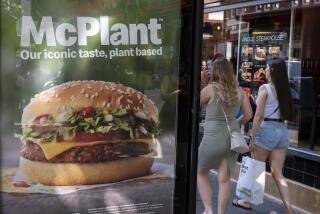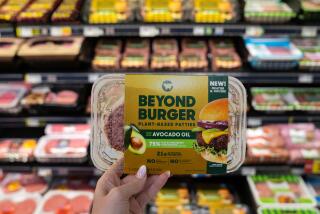Impossible Foods aims to put plant-based burgers on European menus this year

- Share via
Impossible Foods hopes to add its plant-based burgers to European menus this year, bringing to a close a six-year quest to enter the world’s biggest market for meat alternatives.
It would mark a major breakthrough for the company in Redwood City, Calif., as industry sales of plant-based meat substitutes shrink in its core American market. Before rolling out all its products to countries including Germany, the Netherlands and the United Kingdom, the firm is still awaiting final regulatory approvals for its genetically modified ingredient, according to Chief Executive Peter McGuinness.
Alternative proteins are a more environmentally friendly option to meat, but makers have been hit by consumer backlash against their taste, texture and concerns about ultraprocessed ingredients. Meanwhile, demand for meat has been boosted by weight-loss drugs and a wave of MAGA masculinity rhetoric. By contrast, European retailers are still rolling out plant-based ranges to consumers who care more about sustainability.
“Plant-based has more consumption in the [European Union] and the U.K. than the U.S. and people are generally more open to it,” McGuinness said in an interview in London. “We’re ready to go. We know it’s going to get approved.”
Impossible Burger mimics the taste and texture of beef with plant-based ingredients. It contains soy leghemoglobin, an additive known as heme, which helps the product taste, smell and even “bleed” like meat and is derived from a genetically modified yeast strain.
The products are available in countries including Australia, New Zealand and Canada, but Europe’s strict regulations on novel ingredients and genetically modified foods have slowed the approval process.
While the EU’s food safety watchdog ruled late last year the ingredient didn’t raise safety concerns, Impossible Foods is now awaiting the final nod from the European Union officials in the next few months. It also has a pending risk assessment from the Food Standards Agency in the United Kingdom, which it hopes to obtain in late summer. There is a likelihood that the full approval may not come until next year, the company said.
Impossible Foods offers a limited range of plant-based “chicken” products, which don’t contain heme. The company has met with large U.K. retailers such as Tesco, Waitrose and J Sainsbury and “they all want our product because they want to expand their category,” he told the audience of the Bloomberg Sustainable Business Summit in London on Thursday.
“They’re starting to see trends where the consumption’s going down because the consumer wants better tasting food,” he said. “So they would love our products here.”
McGuinness took over as chief executive in 2022 — switching from yogurt maker Chobani — to oversee Impossible Foods’ expansion into retailers and supermarkets in the U.S., which now make up about half of the business, he said.
But the U.S. market has been shrinking, just as investor funding in alternative proteins has dried up and more startups are going out of business. There are some 200 plant-based brands in the U.S., which is confusing to customers, McGuinness said. Impossible Foods has laid off workers over the last few years, as the value of the company’s shares slumped.
McGuinness is dialing down on the climate, anti-cattle rhetoric, which he thinks alienated many people, led to politicizing of the product, and contributed to mismarketing of the category in the beginning.
He’s targeting meat eaters by emphasizing the taste, protein content and nutrient-density of its products. His pitch includes changing the color of packaging from green to red.
“This only works if we get meat eaters to come try the product,” he said. “I know once I get them to try it, they actually like it.”
The repeat rate among customers — a gauge of whether consumers like a product — is “a little bit over 50%,” McGuinness said. Impossible is the fastest growing plant-based company in the world, he said.
Impossible Foods is expanding its distribution network to increase availability. While achieving price parity with conventionally produced meat will take longer, the company’s products are now the same price or less expensive than organic, grass-fed beef, the chief executive said.
“What’s going to bring it to the next level is choice and taste,” McGuinness said. “We’ve doubled down on taste, and at the end of the day it’s food.”
de Sousa writes for Bloomberg.
More to Read
Inside the business of entertainment
The Wide Shot brings you news, analysis and insights on everything from streaming wars to production — and what it all means for the future.
You may occasionally receive promotional content from the Los Angeles Times.










